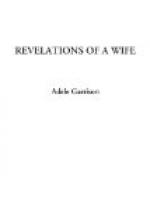“I am not easily alarmed,” I returned, trying hard to keep out of my voice anything save the indifferent courtesy which one would bestow upon a stranger, for the atmosphere of mystery seemed deepening about this stranger and me. I did not believe he had spoken the truth, when he said that my utterance of my maiden name, in response to his question, had nothing to do with his faintness. I was as certain as I was of anything that it was the utterance of that name, the revelation of my identity thus made to him, that caused his emotion. I sat thrilled, tense, in anticipation of revelations to follow.
Mr. Gordon’s voice was quiet, but a poignant little thrill ran through it, which I caught as he spoke again.
“Was not your mother’s name Margaret Bickett and your father’s, Charles Spencer?” he asked.
“You are quite correct.” I forced the words through lips stiffened by excitement.
I saw Dicky look at me curiously, almost impatiently, but I had no eyes, no ears, save for the mysterious stranger who was quizzing me about my parents.
One of Mr. Gordon’s hands was beneath the table; as he was sitting next to his I saw what no one else did—that the long, slender, sensitive fingers pressed themselves deeply, quiveringly, into the palm at my affirmation of his question. But except for that momentary grip there was no evidence of excitement in his demeanor as he turned to me.
“I thought so,” he said quietly. “I have found the daughter of the dearest friends I ever had. Your resemblance to your mother is marvelous. I remember that you looked much like her when you were a tiny girl.”
“You were at our home in my childhood, then?” I asked, wondering if this might be the explanation of my uncanny notion that I had sometime in my life seen this man bending over his demitasse as he had done a few minutes before.
“Oh, yes,” he said, “your mother, as I have told you, was the dearest friend I ever had. And your father was my other self—then—”
His emphasis upon the word “then” gave me a quick stab of pain, for it recalled the odium with which every one who had known my childhood seemed to regard the memory of my father.
I, myself, had no memories of my father. My mother had never spoken of him to me but once, when she had told me the terrible story of his faithlessness.
When I was four years old he had run away from us both with my mother’s dearest friend, and neither she, nor any of his friends, had ever heard of him afterward. I had always felt a sort of hatred of my unknown father, who had deserted me and so cruelly treated my mother, and the knowledge that this man was an intimate of his turned me faint.
But if Mr. Gordon’s inflection meant anything it meant that even if he had been my father’s “other self,” my mother’s desertion had aroused in him the same contempt for my father that all the rest of our little world had felt. I felt my indefinable feeling of repulsion against the man melt into warm approval of him. He had loved the mother I had idolized, had resented her wrongs, and I felt my heart go out to him.




